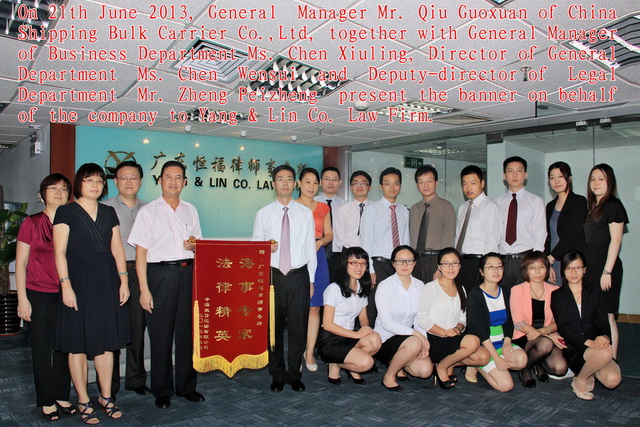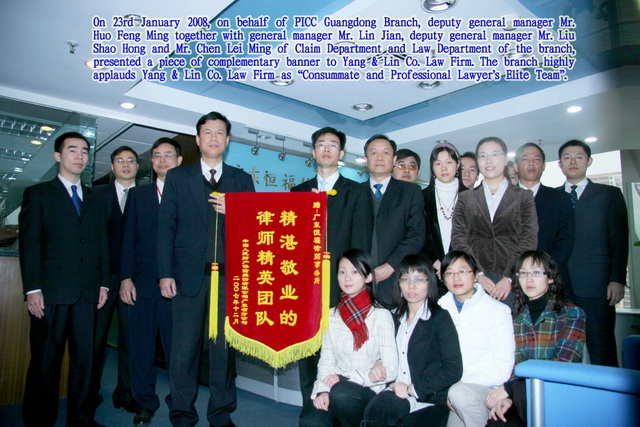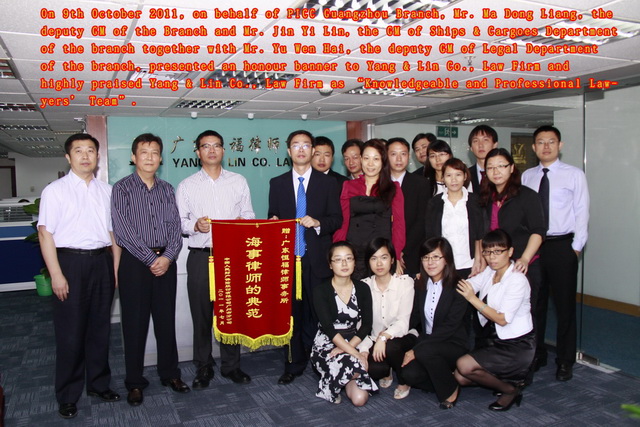The Second Round-table Conference on Rule of Law of Maritime Affairs was successfully held on 19 April 2019. The conference was sponsored by the research institute of the Chinese Academy of Social Sciences, and organized by the “Belt and Road” justice research base of the Supreme People’s Court. More than 60 experts attended the conference. They were from the Supreme People’s Court, the Ministry of Transport, Chinese Academy of Social Science, higher people’s courts, maritime courts, Shanghai Procuratorate, MSAs, Dalian Maritime University, Shanghai Maritime University, East China University of Political Science and Law, Cosco, PICC, China Shipowners Mutual Assurance Association, CPIC, China National Petroleum Corporation, China Maritime Arbitration Commission, law firms and clean up units, etc. the conference discussed the legislation and practice issues on the liabilities of vessel-induced pollution damage.
Director Yang of this law firm was invited by the sponsor and organizer to deliver a speech entitled “several practice issues on liabilities of vessel-induced oil pollution damage” at the meeting.
Yang address four issues:
1. Costs of cleanup and prevention
1.1 the subject of the claims for cleanup and prevention costs. As for the cleanup and prevention response organized by MSA, the MSA and cleanup units should both be entitled to the claim. The MSA have the right of claim in accordance with article 71 of the Marine Environment Protection Law and article 42 of the Regulations on Preventing Vessel-induced Pollution to Marine Environment. As per the CLC and the International Convention on Civil Liability for Bunker Oil Pollution Damage, oil pollution damage should contain the costs of cleanup and prevention, the preventative measures should contain those carried out by the cleanup units organized by MSA. As per the Judicial Interpretation of Oil Pollution, oil pollution damage should contain the costs of cleanup and preventatives. The cleanup units should be entitled to claim to encourage cleanup and preventive measures, and to reduce and prevent water pollution.
1.2 Rate standards of cleanup and preventative measures. 6 calculating standards are provided in judicial practice, including: 1) expenses agreed in the lease contract: such expenses agreed in the writing contract may be supported by court in most cases, including expense for renting ships, vehicles and equipments; (2) rate standards and rates agreed in the “agreement of cleaning up vessel-induced pollution”; (3) rate standards of emergency response; (4) SCOPIC standards; (5) oil pollution fund standards of China; (6) standards formulated by the cleanup units and reported to the price bureau. It is recommended to formulate a unified national standard for cleanup and pollution prevention, and the regional difference coefficient can be considered.
1.3 Priority of compensation for cleanup and prevention costs. The judicial interpretation on oil pollution did not stipulate that the costs should be paid in priority, while the Regulations on Preventing Vessel-induced Pollution to Marine Environment did. It is recommended that the costs should be paid in priority, to encourage cleanup and preventive measures, and to reduce and prevent water pollution.
2. Subject of claim for marine eco source damage
2.1 Plaintiff subject of the public interest ligation of marine source and eco-environment damage
The first subject should be the marine environment supervising and managing authorities and the second was prosecuting authorities, according to article 55 of the Civil Procedure Law and article 5 and 89 of the Marine Environment Protection Law.
2.2 Authorities that enforce the right of supervising and managing marine environment
According to Articles 5 and 89 of the Marine Environment Protection Law, the Ministry of Eco-environment, the local marine fishery department (bureau), and the fishery administrative agencies under the Ministry of Agriculture need to coordinate over the claims for marine resources and the eco-environment.
3. Subject of Liability
As for oil spill accident where only one vessel involved, the shipowner should be liable in most cases according to article 3 of the CLC and article 3 of the Bunker Convention. As for oil spill arising from collision of two vessels, the shipowner of the vessel that leaks oil should be liable.
4. Liability Limit
It’s controversial to identify and determine the concept of “shipwreck” as provided in article 20 of the judicial interpretation of oil pollution. It’s recommended to formulate unified standards for identification.





